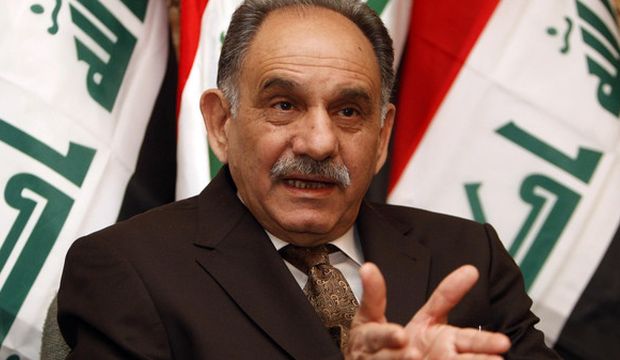
Saleh Al-Mutlaq, an Iraqi Sunni lawmaker who was disqualified from running in March’s parliamentary elections by the Justice and Accountability Commission for alleged links to Saddam Hussain’s outlawed Ba’ath Party, speaks during an interview with Reuters in Baghdad, Iraq on February 12, 2010. (Reuters/Thaier al-Sudani)
Baghdad, Asharq Al-Awsat—Iraq’s National Guard project will go ahead, despite opposition from some domestic political parties, Iraqi Deputy Prime Minister Saleh Al-Mutlaq said.
In a broad-ranging interview with Asharq Al-Awsat, Mutlaq criticized the time it is taking for Baghdad to establish a National Guard, part of a wider project to take the fight against the Islamic State of Iraq and Syria (ISIS) across Iraq’s various governorates.
“This [National Guard forces] must be established based on laws. The law establishing a National Guard must be issued by parliament, but until this time parliament has yet to put forward the draft bill for this to vote on. There are some parties that do not want this project to see the light of day,” Mutlaq said.
“These parties are well-known and want to ensure that these areas [of Iraq] remain under their control. They fear any new power emerging in the western areas of the country,” he added.
While ISIS fighters have a strong presence in western Iraq, having initially taken control of large parts of Anbar governorate in July 2014, the majority of local tribal forces fighting the jihadist group are Sunnis with many fearing that the establishment of National Guard forces could diminish Sunni control of the region.
“I believe that there is a consensus by the political blocs, with the agreement of the international community, to form National Guard forces . . .Therefore, it will be difficult to disavow this project,” the Iraqi Deputy Prime Minister told Asharq Al-Awsat.
Although Mutlaq criticized the speed with which the Abadi government is instituting policy to confront ISIS in Iraq, he acknowledged that the prime minister inherited a very difficult task from his predecessor, former Prime Minister Nuri Al-Maliki.
“If you are talking about intentions, then I think that over the past three months Haider Al-Abadi and his administration have made a good beginning towards working seriously to serve the country . . .but the steps they are taking to finish this task are taking place very slowly,” he said.
“I understand that he [Abadi] inherited a difficult legacy—Iraq’s military apparatus has been devastated and the economy has collapsed. So we acknowledge that there are serious economic and military difficulties, in addition to the lack of vision on the part of the international community regarding the fight against ISIS,” Mutlaq said.
The Iraqi Deputy Prime Minister questioned the US-led anti-ISIS alliance’s seriousness towards eradicating the group across Iraq. “There are question marks over the extent of the seriousness with which the international coalition is fighting ISIS. There is no real seriousness on the part of the international community to confront ISIS. This is a large international alliance that could defeat ISIS in one month if it wanted to,” he added.
Mutlaq also said that international support to rebuild and restructure Iraq’s ailing military forces have also fallen short. “We face a major problem in rebuilding the military. This requires a real process of restructuring to rebuild it as soon as possible. We must rely on our own capabilities because I don’t believe that there is any genuine international support to rebuild Iraq’s military apparatus to confront ISIS,” he said.
